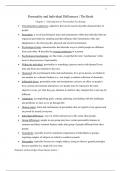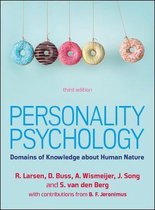Summary
Samenvatting Personality Psychology - Personality and individual differences (PSBE1-05)
- Course
- Institution
- Book
This summary contains is a concise yet descriptive tool for the book. It has the most important parts of the book, and these are linked to the lectures. Whenever you see a [!], this means this part has specifically been discussed during the lecture. Topics that have not been mentioned during the le...
[Show more]




